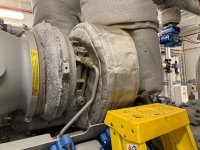In the wake of Hurricane Idalia’s landfall in Florida’s Big Bend near Keaton Beach on Wednesday, a local fire and rescue department has warned owners of electric-powered vehicles including golf carts and scooters that
exposure to salt water can cause the vehicles’ batteries to catch fire.
Palm Harbor Fire Rescue on Florida’s Gulf Coast issued the warning on Facebook Wednesday afternoon, telling owners to move their battery-powered vehicles
out of their garages if they had come in contact with salt water, to prevent the fire spreading to the structure.
The warning was apparently triggered by a fire in a Tesla Wednesday in nearby Dunedin, a city just south of the unincorporated area of Palm Harbor.
“If you own a hybrid or electric vehicle that has come into contact with saltwater due to recent flooding within the last 24 hours,
it is crucial to relocate the vehicle from your garage without delay.,” the post warned.
“Saltwater exposure can trigger combustion in lithium-ion batteries. If possible, transfer your vehicle to higher ground.”
The state fire marshal warned last year in the wake of
Hurricane Ian’s devastation of the threat the
electric vehicle batteries posed to those living in coastal areas subject to storm surges.
Florida Fire Marshal Jimmy Patronis had
previously gone public with his worries before sending a letter last October seeking answers from the
National Highway Traffic Safety Administration about what the Sunshine State could be facing in the future.
In a letter sent Oct. 7, 2022, to NHTSA Executive Director Jack Danielson, Patronis set a deadline of Oct. 14 for the national agency to answer questions regarding the threat to Florida firefighters from
electric vehicles in the hurricane zone with lithium batteries that have been damaged by exposure to saltwater and
eventually ignited because of it.
In the letter, Patronis summarized his own experiences last week when he witnessed first-hand the difficulty firefighters experience extinguishing a fire in an electric vehicle.
“On October 6th, I joined North Collier Fire Rescue to assess response activities related to Hurricane Ian and saw with my own eyes an EV continuously ignite, and continually reignite, as fire teams
doused the vehicle with tens-of-thousands of gallons of water.
“Subsequently, I was informed by the fire department that the vehicle,
once again reignited when it was loaded onto the tow truck. Based on my conversations with area firefighters,
this is not an isolated incident.
As you can appreciate, I am very concerned that we may have a ticking time bomb on our hands.”
Patronis asked five questions, paraphrased below:
- Has the NHTSA instructed manufacturers of electric vehicles to inform customers about the particular dangers flooding pose to lithium batteries?
- Does standard firefighter gear protect against gases from EV fires?
- Should removing EVs from a hurricane zone be a designated duty in storm cleanup efforts?
- Does the NHTSA have information about specific timelines for the danger from post-flooding fires in EVs?
- Does the NHTSA have any guidance on locations where compromised electric vehicles can be taken where they can burn out safely?
In an email to The Western Journal on later that week, the NHTSA said it had been studying the impact of saltwater corrosion on
electric vehicles for a decade — since Superstorm Sandy in October 2012.
“Fires in electric vehicles can pose unique challenges for firefighters and other first responders,” the email stated. “Since similar issues emerged with EVs after Superstorm Sandy, NHTSA has been researching the effect of saltwater immersion on batteries, and working with stakeholders to equip first responders with best practices on fighting battery fires.”
In 2021, the NHTSA launched a
Battery Safety Initiative. According to the website
CNET, the goal is to “research areas such as battery diagnostics, management systems and even cybersecurity to ensure future cars with batteries onboard to power the entire vehicle are as safe as can be.”
Until those answers are made clear, however, it’s best simply to understand the dangers and do what we can to mitigate them — including, obviously, keeping salt water away from EVs and EVs away from salt water.








